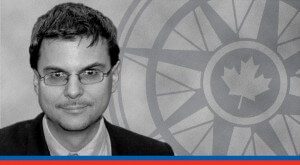 Licensing religious leaders. Blocking suspect websites. Dissolving dangerous organizations. They are ideas for expanding government power that discomfort many Canadians. But in the wake of the Paris attacks Christian Leuprecht says we have no choice but to debate them.
Licensing religious leaders. Blocking suspect websites. Dissolving dangerous organizations. They are ideas for expanding government power that discomfort many Canadians. But in the wake of the Paris attacks Christian Leuprecht says we have no choice but to debate them.
By Christian Leuprecht, the Toronto Sun, Nov. 23, 2015
France is profoundly marked by the small “r” republican value of laïcité.
What does this mean?
The English translation of “secularism” doesn’t quite capture it.
Laïcité is a notion of the public where any citizen is accepted — as long as they buy into a “thick” understanding of what it means to be French, including checking religion at the door.
Hence the ban on “religious” symbols in France, such as the veil, in public spaces.
Religion is to be enjoyed only in private. My French colleagues feel France was 20 years too late in introducing Arabic as a foreign language in schools only now; and in having legislation around licensing Imams as the U.K. and Austria, for instance, already do.
France’s emergency decree now allows the state to dissolve religious associations and institutions that peddle discourse the state deems unacceptable.
France is also expanding authorities’ power to block suspect websites and social media and, in some circumstances, require suspected sympathizers of violent extremism to wear electronic monitoring devices.
A blanket ban on the veil in public spaces seems to me fundamentally incompatible with democratic ethnoculturally diverse societies.
But should Canada license religious leaders (of any religion, not just Islam)?
This is a controversial matter, as we discovered in June when the idea was floated, among a dozen others, in an interim report from the Senate security and defence committee.
Although not endorsed by all members of the committee, the report is worth reading because its proposals merit public debate.
Canadians should ask themselves what ought to be done — now.
If we’re complacent, there’s a risk that, 20 years hence, we, too, may end up confronting challenges such as those in France.
Canada has the highest legal per capita immigration rate of any western democracy, yet most of our immigrants come from countries that are hardly flourishing democracies.
This raises concerns about Canada’s capacity to socialize new arrivals into democratic norms and values.
No longer can we assume this will just happen automatically.
Instead, the federal government needs to be much more explicit about promoting the values Canadians share and cherish.
No institution in civil society — religious or otherwise — should be allowed to advocate norms or ways of being that are fundamentally at odds with our constitutional democracy.
Civil liberties and constitutional protections shouldn’t extend to those who abuse them to tear down the democratic edifice or promote ways of life that are fundamentally incompatible with core democratic values.
In effect, that means being far more rigorous about rooting out discourse that runs counter to Canadian values, and institutions where dystopian narratives are sewn.
The ISIS declaration that accompanied the attacks in Paris denounced freedom and the western way of life — in word, timing, and the choice of targets.
If we don’t want to find ourselves on the front line of physically having to defend democracy — as the French are now having to do — Canadians had better stand up for the democratic values they cherish.
Make no mistake: this is a war, a war of ideas. Which side are you on?
Christian Leuprecht is a professor at the Royal Military College of Canada and Queen’s University, and a senior fellow at the Macdonald Laurier Institute




